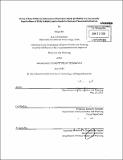| dc.contributor.advisor | Karen R. Polenske. | en_US |
| dc.contributor.author | Chu, Yang, M.C.P. Massachusetts Institute of Technology | en_US |
| dc.contributor.other | Massachusetts Institute of Technology. Department of Urban Studies and Planning. | en_US |
| dc.date.accessioned | 2013-10-24T17:36:39Z | |
| dc.date.available | 2013-10-24T17:36:39Z | |
| dc.date.copyright | 2013 | en_US |
| dc.date.issued | 2013 | en_US |
| dc.identifier.uri | http://hdl.handle.net/1721.1/81627 | |
| dc.description | Thesis (M.C.P.)--Massachusetts Institute of Technology, Dept. of Urban Studies and Planning, 2013. | en_US |
| dc.description | Cataloged from PDF version of thesis. | en_US |
| dc.description | Includes bibliographical references (p. 35-37). | en_US |
| dc.description.abstract | It is now common knowledge that China's data is bad, and China's environment is polluted. In this paper I develop a simple pollution intensity index to test China's existing national and local environmental data, to answer the questions: "Bad" how? "Polluted" why? And finally: what can be done? I find that China's existing data is rudimentary, piecemeal, and inaccurate. I find that government data is not detailed, not transparent, and that non-governmental attempts at improving data quality and transparency are hamstringed by lack of official support. These data quality and transparency issues contribute to the intractability of China's industrial pollution. I also find that a pollution intensity index, like the one I develop and test in this study, can help policymakers identify pollution hotspots years before the hotspots worsen into public health emergencies. By running 2010 data through a simple algorithm, I isolate a pollution hotspot that took the Chinese government until 2013 to discover without this framework. I show that better and more accurate data, along with a mandate for continuous monitoring and analysis, can shift the current strategy from pollution control to pollution prevention, ultimately saving time, money, and lives. | en_US |
| dc.description.statementofresponsibility | by Yang Chu. | en_US |
| dc.format.extent | 49 p. | en_US |
| dc.language.iso | eng | en_US |
| dc.publisher | Massachusetts Institute of Technology | en_US |
| dc.rights | M.I.T. theses are protected by
copyright. They may be viewed from this source for any purpose, but
reproduction or distribution in any format is prohibited without written
permission. See provided URL for inquiries about permission. | en_US |
| dc.rights.uri | http://dspace.mit.edu/handle/1721.1/7582 | en_US |
| dc.subject | Urban Studies and Planning. | en_US |
| dc.title | China Urban Pollution Information Disclosure Study (CUPIDS) : socioeconomic implications of dirty industry and a guide to national cleandustrialization | en_US |
| dc.title.alternative | Socioeconomic implications of dirty industry and a guide to national cleandustrialization | en_US |
| dc.type | Thesis | en_US |
| dc.description.degree | M.C.P. | en_US |
| dc.contributor.department | Massachusetts Institute of Technology. Department of Urban Studies and Planning | |
| dc.identifier.oclc | 859158465 | en_US |
